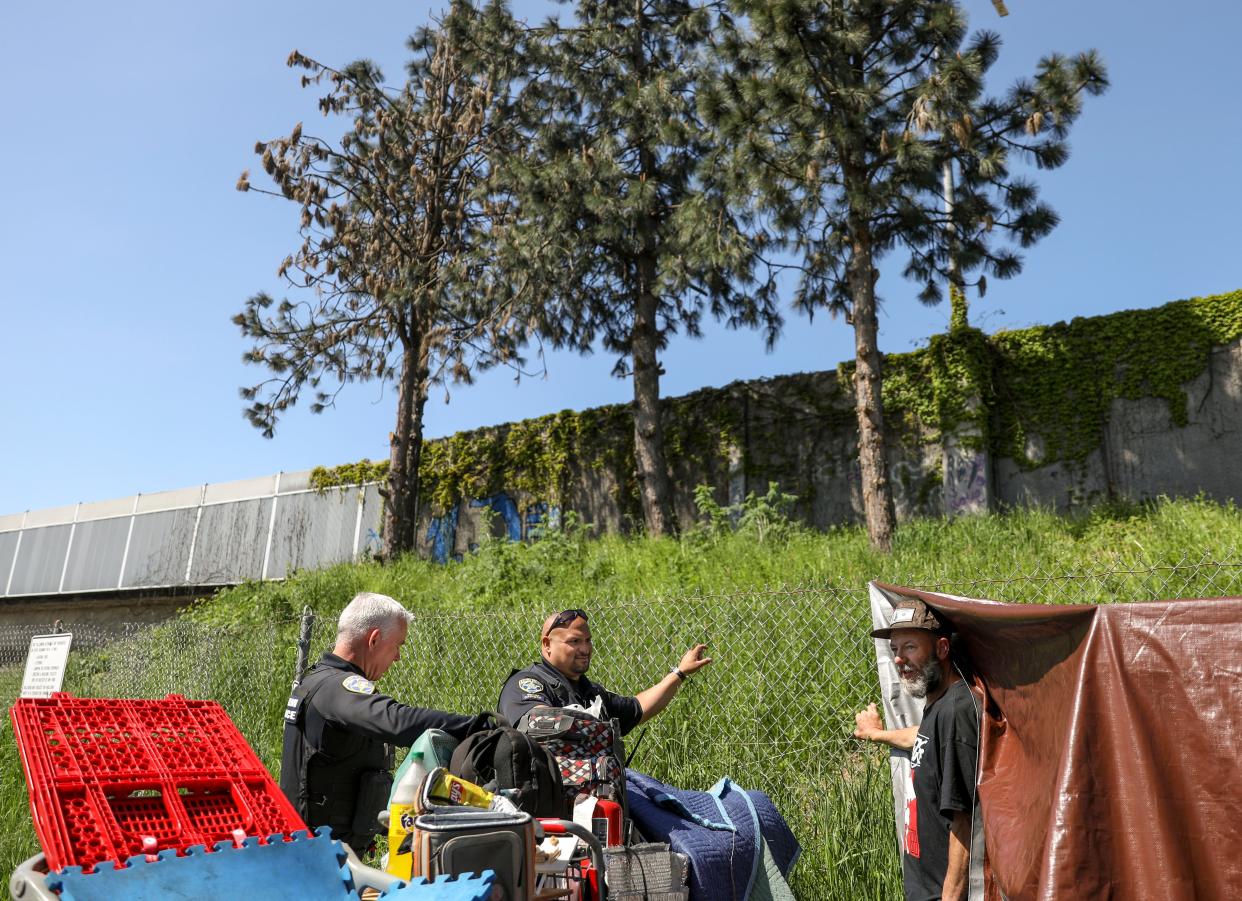What’s on the line as Salem faces $11M budget shortfall? Here are 5 things to know

Salem is facing an $11 million budget shortfall.
This means by next year, the city's projected revenue will not be enough to pay for current services.
City leaders are considering adding an operations fee and an employee-paid payroll tax to address the deficit.
If the shortfall is not addressed, cuts could include shuttering the recently opened homeless navigation center and microshelter sites, not hiring for critical staffing like police and fire, and cutting services.

The city's budget committee, a collection of councilors, staff and residents, voted during the budget meeting Wednesday night to send the decision of whether to add a payroll tax to city council. Council will then decide whether to implement a payroll tax or send the choice to voters in November.
The proposed expenditure budget for fiscal year 2024 is $749.6 million. The fiscal year begins July 1 and ends June 30, 2024.
Here are five things to know about the city's budget:
Why is there an $11 million deficit?
This year marks the first time city manager Keith Stahley is crafting a budget with the City of Salem.
"Salem is a community in transition," Stahley said in his statement in the city's proposed budget. "Over the past 10 years, Salem’s population has grown by over 20,000 people and our service demands have expanded well beyond this increase."
But as Salem's population grew by a number almost equivalent to the entire city of Woodburn over the past decade, its revenues have failed to keep pace with the city's growing demands.
Stahley said the proposed budget is a step toward addressing that gap.
Salem is not alone in its deficit, he added.
"Cities across Oregon are facing similar structural imbalances between revenues and expenditures," he said, pointing to property tax measures from the 1990s capping tax revenues as one the reasons behind the phenomenon.
As a result, the money the city receives from property taxes is not keeping up with inflation and population growth.
The city has known for years it would be facing a shortfall. City leaders reduced services and slowed hiring in the years since the 2008 recession to keep general fund services solvent. Before the pandemic, the city added the city operations fee and considered putting an employee-paid payroll tax on the May 2020 ballot.
The pandemic put a pause on the payroll push. At the same time, an influx of federal relief dollars, including American Rescue Plan Act funds, temporarily alleviated budget shortfalls.
"We're fortunate that we've had the ARPA funds in order to carry us over the last couple of years and it's supplemented our fund balance, and they've allowed us to avoid this difficult conversation for the last couple of years," Stahley said. "I don't hear any hooves beating on the ground. I don't see anybody riding to our rescue."
With the ARPA funds dried up, the city now has to find the revenue to continue services.
Is an operations fee going to happen?

Signs point to a strong likelihood, but the city council has yet to take formal action.
The proposal includes a one-time increase of the city operations fee of $5.50 for a residential unit, $4.40 per multi-family housing unit and $26.51 for industrial, institutional and commercial properties.
The increased fee is proposed to fund a combination of existing and new services. New positions include two code enforcement officers to enhance the response to neighborhood concerns, two park rangers to expand service to other parks, two security officers for the civic center campus, and four support services staff.
Ongoing funding for continuous security at the downtown parkades is a supported service throughthe fee increase.
The Salem Outreach and Livability Services Team is a specialized team that pairs officers with Public Works employees to quickly respond to illegal encampments in parks and public rights-of-way. The police portion of the team is referred to as the Homeless Services Team. The team was created last year and garnered praise for its compassionate, efficient approach to camps that presented safety risks.
More: New Salem team is trying a different response to homeless encampments
The proposed budget includes $1.24 million to expand the team by four full-time positions to increase services to seven days per week. This expansion is funded with the proposed increase to the city operations fee.
The estimate in the budget proposal is $5.13 million for the increase in the city operations fee, bringing the total amount from the fee to $13.6 million — a 71% increase from the 2023 fiscal year.
According to city officials, the monthly rate would be expected to increase in July to $14.43 per residential account, $11.54 per multifamily unit and $69.55 per commercial account.
Stahley said the operations fee increase is a step toward closing the budget deficit, but more revenue needs to be created to sustain existing services.
Will adopting the budget automatically create a payroll tax?
No, the payroll tax is not included in the budget.
The topic became a hot-button issue during Wednesday's budget committee meeting. The committee is not tasked with taking action to enact the tax, but they could make a recommendation to the city council, which could vote on whether to implement the tax or send the issue to voters.
Some, including councilors Julie Hoy and Deanna Gwyn, said it should only go forward if passed by voters.
Councilor Virginia Stapleton said the city would be on a tight deadline to get the tax on the November ballot, educate voters on its importance and enact it before the city hit a budget cliff next year. Allowing council to vote on the tax would get the ball rolling faster, avoiding the shortfall and having to cut services.
The committee ultimately voted to recommend the council consider voting on the tax, sending it to voters or a mixture of both — enacting the tax while allowing voters to consider keeping it in place after the initial shortfall is addressed. Regardless, the council seems set on seeking "equity" in crafting the tax rate by not taxing minimum-wage workers.
In 2021, Eugene implemented a payroll tax to pay for new police officers, emergency services and homelessness reduction efforts. It was set to generate $23.6 million annually.
The potential tax rate in Salem has not been formalized.
Early signs point to Salem's potential payroll tax being less than Eugene's. In Eugene, an employee who earns $20 an hour pays about $7 a month in payroll tax.
What will happen if the city does not find additional revenue?
During the budget meeting on April 19, Stahley said the city would be faced with big decisions and hard cuts should the shortfall in revenue go unaddressed.
"I can tell you that everything in this budget is important," Stahley said. "There is nothing in there that's superfluous."
Many of the most recently added services, like the microshelter sites and homeless navigation center, would have to close. DJ Vincent, founding pastor with microshelter site manager Church at the Park, said 592 people were served by the microshelters in 2022.
The majority of those people moved out of homelessness and into permanent, transitional or supportive housing. A recent point-in-time count found about 1,500 people were homeless in Salem. Homelessness continues to be on the rise in Salem.
"Even though we impacted that many folks with this pilot project, there are still more to serve," Vincent said. "(These shelters) need increased revenue or they will go away."
Andrew Cohen, who represents Ward 4 on the budget committee, said Salem is at a crossroads and requires investment in order to be a world-class city, not just one with a reputation as being ideal due to being "an hour away from everything."
"It’s high time to turn this phrase on its proverbial head," Cohen said. "It is time to make big investments in Salem and get people to view our city not as a place to escape from, but a destination to go toward."
Cohen, who works as a fiscal analyst at the Oregon Health Authority, pointed out that a recent audit by Moss Adams verified the city’s ability to budget and concluded that compared to other full-service peer cities, Salem is understaffed by 25 to 50 positions and under-resourced by $49 million.
He said he doesn't see a path forward without additional revenue. The deficit is in the general fund, the bulk of which is used for fire and police services. Staff and funding cuts mean slower emergency response times, fewer officers, reduced library hours and less maintained parks, city staff said.
"Salem will need to raise taxes to maintain vital services for our city," Cohen said. "However, a tax-only approach will not build upon the foundation and progress seen over the past 10 years. Salem will need to invest in building capacity that attracts new businesses and residents to our city which will also increase the tax base for our city, a true win-win approach."
What comes next?
The budget committee recommended the 2024 budget Wednesday night. The budget now goes to the city council for consideration. Council will hold its public hearing on the budget on June 12. It must be adopted by June 30.
The city operations fee would be formally adopted by council on June 12.
The budget does not feature the employee-paid payroll tax. It must be enacted in a separate action by the city council. The council will consider options including the structure of the proposal and rates at its Monday work session.
To read the proposed budget, go to: cityofsalem.net/government/budget-finance/annual-budget.
Want to try to balance the city's budget? Check out the new budget simulation tool, Balancing Act, at cityofsalem.net/government/budget-finance/annual-budget/get-involved-in-the-budget-process.
For questions, comments and news tips, email reporter Whitney Woodworth at wmwoodworth@statesmanjournal.com, call 503-910-6616 or follow on Twitter @wmwoodworth
This article originally appeared on Salem Statesman Journal: What’s on the line as Salem faces $11M budget shortfall?

